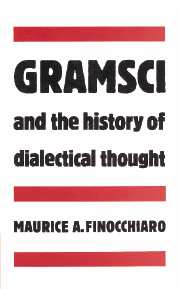Book contents
- Frontmatter
- Contents
- Preface and acknowledgments
- INTRODUCTION: AN APPROACH TO GRAMSCI
- Chapter 1 GRAMSCI'S CROCEAN CRITIQUE OF CROCE'S PHILOSOPHY
- Chapter 2 CROCE AND THE THEORY AND PRACTICE OF CRITICISM
- Chapter 3 GRAMSCI'S METHODOLOGICAL CRITICISM OF BUKHARIN'S SOCIOLOGY
- Chapter 4 BUKHARIN AND THE THEORY AND PRACTICE OF SCIENCE
- Chapter 5 GRAMSCI'S DIALECTICAL INTERPRETATION OF MACHIAVELLI'S POLITICS
- Chapter 6 GRAMSCI'S POLITICAL TRANSLATION OF HEGELIAN-MARXIAN DIALECTIC
- Chapter 7 HEGEL AND THE THEORY AND PRACTICE OF DIALECTIC
- Chapter 8 GRAMSCI AND THE EVALUATION OF MARXISM
- CONCLUSION: DIALECTICAL METHODOLOGY AND TEXTUAL CRITICISM
- Appendix: Concordance of critical edition and English translations
- Notes
- Bibliography
- Index
Chapter 7 - HEGEL AND THE THEORY AND PRACTICE OF DIALECTIC
Published online by Cambridge University Press: 10 December 2009
- Frontmatter
- Contents
- Preface and acknowledgments
- INTRODUCTION: AN APPROACH TO GRAMSCI
- Chapter 1 GRAMSCI'S CROCEAN CRITIQUE OF CROCE'S PHILOSOPHY
- Chapter 2 CROCE AND THE THEORY AND PRACTICE OF CRITICISM
- Chapter 3 GRAMSCI'S METHODOLOGICAL CRITICISM OF BUKHARIN'S SOCIOLOGY
- Chapter 4 BUKHARIN AND THE THEORY AND PRACTICE OF SCIENCE
- Chapter 5 GRAMSCI'S DIALECTICAL INTERPRETATION OF MACHIAVELLI'S POLITICS
- Chapter 6 GRAMSCI'S POLITICAL TRANSLATION OF HEGELIAN-MARXIAN DIALECTIC
- Chapter 7 HEGEL AND THE THEORY AND PRACTICE OF DIALECTIC
- Chapter 8 GRAMSCI AND THE EVALUATION OF MARXISM
- CONCLUSION: DIALECTICAL METHODOLOGY AND TEXTUAL CRITICISM
- Appendix: Concordance of critical edition and English translations
- Notes
- Bibliography
- Index
Summary
I have argued that two concepts of dialectic inhere in the Prison Notebooks, a formalist one pertaining to “real” dialectic and a judgmental one referring to “ideal” dialectic; that there is a tension (though not an outright contradiction) between them; and that the judgmental concept is the more typically Gramscian one. If this settles the matter from the point of view of interpretation and internal evaluation, it also leads to the problem of assessing the two concepts with independent arguments. One way of proceeding is to point out that the two concepts correspond to Gramsci's theory and his practice of the dialectic, respectively. That is, the formalist concept is the meaning Gramsci attaches to the dialectic when he is most explicit in his pronouncements about what the dialectic is and about how it operates, whereas the judgmental concept is what he means when he is using the term in the context of other issues that relate to the dialectic more implicitly and indirectly. In short, Gramsci's official view is that the dialectic is the process of thesisantithesis-synthesis that exists only at the level of the socioeconomic structure, whereas his implicit view is that it is a way of thinking in which one avoids one-sidedness and searches for unity in diversity and diversity in unity. Thus, Gramsci's dialectical theory and his dialectical practice do not correspond. Assuming the primacy of practice, we would have to conclude that the judgmental notion is what Gramsci really means by dialectic.
- Type
- Chapter
- Information
- Gramsci and the History of Dialectical Thought , pp. 181 - 230Publisher: Cambridge University PressPrint publication year: 1989

